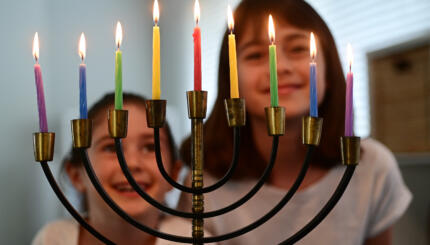As a convert, I have always felt a special responsibility to actively choose Judaism. Each new choice I make reminds me to live a Jewish life with kavanah, with loving intent. I have to make being Jewish happen.
My fledgling faith was galvanized by the charge to make Shabbat. I was just building my Jewish home back then, balancing a young toddler and graduate school, and there was something magical about cleaning house and setting the table because the very week depended on it. This special charge, to choose and make my faith, informed my observance of other mitzvot, other holidays. I could and did make them my own, and, throughout the Jewish year, it was empowering and moving…
…until Hanukkah rolled around, like a record scratch.
I never approached with curiosity or wonder. Growing up in America, I was pretty sure I understood Hanukkah just fine. Hanukkah is the only Jewish holiday American advertising notices: In Hallmark ads and craft stores, Hanukkah is the “Jewish Christmas,” blue-and-silver instead of red-and-green, subbing in menorahs for yule logs. Hanukkah, I thought, was a mandate to race around town (or, as the years went on, Amazon), piling up presents and toting 10-pound bags of potatoes.
One year, on the first night of Hanukkah, my 6-year-old opened his present, found a book, and burst into tears, wailing, “I want a real present!” Once I stopped wincing, I had to admit to myself that, like a canary in a coal mine, my son was expressing what I couldn’t yet articulate. Hanukkah was so unsatisfying because I was living a sterile, commercial definition of the holiday. Far from making Hanukkah, we were simply accepting it.
So I decided to take drastic action. We would make Hanukkah. Literally. By hand.
For much of the year, I imagined our family would make each other’s Hanukkah presents, learning a valuable lesson about love and commercialism. Six weeks out from our Handmade Hanukkah, I admitted to myself that the odds of convincing anyone else to do this were almost nil, and revised my plan: we would engage in a hands-on activity every day, something that would, hopefully, inspire us to approach even this holiday with intent.
For more Hanukkah craft and activity ideas, check out our partner site, Kveller.com.
For the first few days, my children dutifully dyed and glued popsicle sticks. They cut out stars of David to make garlands. I hovered, jumping in to take over the crafts when the results were less than perfect. I gathered photographic evidence to post on Facebook. The kids looked great, albeit without a trace of enthusiasm. (Not pictured: kavanah.)
On the fourth day, I laid out brushes and glue and glitter and one hundred small wooden dreidels.
Bedazzling a wooden is not particularly complicated: hold a small dreidel by its handle, painting the four sides with glue, pour a thick layer of glitter on all four sides, gently dust it off, then lay the dreidel on wax paper to dry.
It’s a meditative process, repeating the same simple motions. You might fall into cheerful conversation with your family, painting and glittering by weak winter light. Someone might get up and turn on Joshua Nelson’s gospel-inflected Mi Chamocha, then return to immerse herself in making again; someone else might disappear and reappear, a few minutes later, with mugs of cocoa.
At some point, we all looked up to realize the last dreidel was being painted. We had spent the entire afternoon working together, listening to music, and, now, the whole dining table was covered in twinkling, drying dreidels.
Every year, now, the morning before Hanukkah begins, I unpack dozens of light and dark blue dreidels. Sometimes, I scatter them on the mantlepiece. Last year, after a Pinterest binge, I set them out in canning jars. For us, those dreidels mean the holiday can begin. It doesn’t matter, now, whether the presents are perfect. This is how we do this holiday.
Somehow, in spending an afternoon, we finally made Hanukkah.



